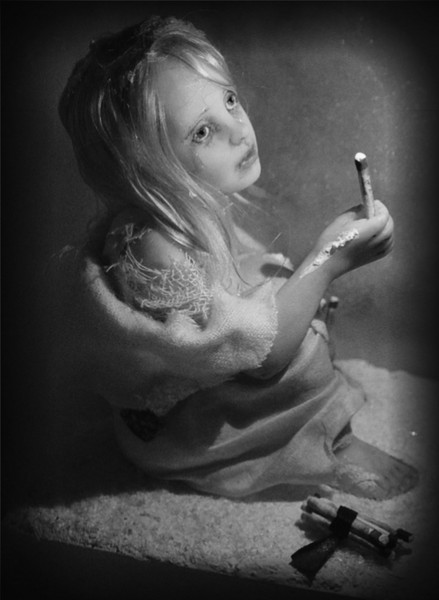BMOP marks Good Friday with contrasted “Passions”

People who like the sound of straight-toned voices singing intricate counterpoint at close intervals had a feast at New England Conservatory’s Jordan Hall on the evening of Good Friday, as the Boston Modern Orchestra Project presented works with “Passion” in the title by David Lang and Arvo Pärt.
The two works in BMOP’s “Dual Passions” program plainly approach the idea from very different perspectives. Pärt’s Passio Domini Nostri Jesu Christi secundum Joannem (The Passion of Our Lord Jesus Christ According to John) is an act of Christian devotion, a retelling of the story of Jesus’s arrest and death in the century-old tradition of passion plays and musical settings.
Lang’s The Little Match Girl Passion, on the other hand, is a meditation on human suffering based on Hans Christian Andersen’s Dickensian tale of a little match-seller freezing to death in the street while imagining herself joining her grandmother in heaven. Christ’s cry to God from the cross, “Eli, Eli,” is interpolated at this point, seemingly equating the grandmother with God, except the grandmother welcomes the little girl in, whereas Jesus is saying that God…oh, never mind. This is a music review.
The music-making was superb throughout the evening. The Lang work–laid out Bach-style, with Andersen’s narrative alternating with poems evoking emotion–is scored for vocal quartet, the singers gently accompanying themselves on percussion instruments.
Lang’s delicate, minimalist writing for the voices recalled Heinrich Schütz and La Monte Young in equal measure, with a bit of Hildegard of Bingen thrown in. Instead of acting out the story or putting musical metaphors to the text à la Bach, Lang’s score evoked fleeting emotions with a wonderful variety of contrapuntal and vocal effects—voices going in and out of phase, babbling tremolos—and enough metrical complexity to require a conductor (Andrew Clark, in this case) to sit in front of the four musicians and keep time.
The singer-percussionists—Shari Wilson, Mary Gerbi, Michael Barrett, and Brian Church—realized Lang’s evanescent vocal textures and percussion accents with outstanding sensitivity and skill, leaving no doubt as to why this richly-imagined work was awarded the Pulitzer Prize in 2008. A listener might question Lang’s theology in associating this sad little story with a narrative of divine sacrifice, but not his profound empathy with the hopes and fears of those who suffer.
In contrast, Pärt’s Passio served the biblical story straight, no chaser—no arias, no chorales, no interpolated poetry, not even much musical dramatization other than an increase to fortissimo on the line “Crucifige eum!” (Crucify him!). The music’s quasi-minimalist patterns and emotional reserve placed the Vulgate Latin words of St. John’s gospel front and center, inviting the listener to contemplate the text rather than the setting. The biblical words unfolded so slowly that the video screens on either side of the stage had time to display not only the English translation but also images from Passion art of the Middle Ages to the present.
In the solo roles of Jesus and Pilatus, baritone Sumner Thompson and tenor Matthew Anderson were well-matched vocally, and delivered their lines of dialogue with the simplicity and emotional neutrality required in Pärt’s concept of the piece.
The rest of the story’s dialogue, whether spoken by individual characters or shouted by the crowd, was assigned to the chorus. The 50-plus singers of the Harvard-Radcliffe Collegium Musicum performed these brief utterances with admirable blend and intonation.
Coincidentally for this concert, the role of Evangelist went again to a vocal quartet, accompanied by a sort of expanded continuo of organ, violin, cello, oboe, and bassoon. This ensemble carried most of the musical freight of the evening, maintaining pinpoint intonation and staying focused on the ever-shifting melodic patterns and meters of Pärt’s trademark “tintinabulatory (bell-ringing) style as they slowly told the biblical story.
That feat of concentration produced an ear-boggling array of close-harmony sonorities—especially when countertenor Martin Near and soprano Margot Rood got going in an unaccompanied duet, seemingly generating overtones and wave-interference patterns that not even dogs could hear, had there been any in the audience.
Still, one senses that this composer cares less about how we think his piece sounds than about how much closer it brings us to God. It was an appropriate thought to leave the audience with on Good Friday.
BMOP’s next orchestral concert is “Apollo’s Fire,” works of Stravinsky, Bolcom, and Spratlan, at Jordan Hall, May 18. bmop.org. 781-324-0396.
Posted in Performances





Posted Apr 07, 2012 at 8:19 pm by David Pap
I found the David Lang “The Little Match Girl Passion” to be awesome and the performance fantastic!
On the other hand, I was somewhat disappointed by the Avro Part St. John Passion, which I found to be too one dimensional, like a 75 minute Gregorian chant in a way without much variety of expression. The performance was excellent and the four voices representing the Evangelist superb.